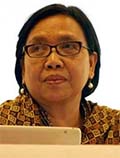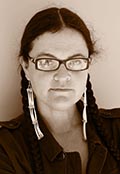
|
Flavia Agnes is a feminist legal scholar, a public intellectual and a women’s rights lawyer. A pioneer of the women’s movement, she has worked consistently on issues of violence against women. Her widely published writings have provided a vital context for feminist jurisprudence, human rights law and gender studies in India. Significant among her many publications are Law & Gender Inequality – The Politics of Personal Laws in India (1999), Women and Law (co-edit) (2004), Family Law (two volumes) – a prescribed text book for law students (2011) and Negotiating Spaces (2012) (co-edit). Flavia is a prominent advocate of legal pluralism, particularly in the realm of family law. Her writings on this issue have provided a complex framework for protecting the rights of minority women within the rubric of legal pluralism.
|

|
Zazie Bowen is an early career anthropology researcher and sessional lecturer based in the Centre for Aboriginal Economic Policy Research at The Australian National University. Building on her doctoral research into children's peer play in rural tribal communities in Odisha, India, Zazie's postdoctoral research focuses on the social processes associated with the increasing privatisation of schooling. She foregrounds the responses of students in marginalised communities. Zazie's research is an intersection of gender studies, childhood studies, visual anthropology, innovative education research methodologies, medical anthropology approaches to mental health and wellbeing, Aboriginal studies and futures studies.
|

|
Junyi Cai is a PhD student in the Department of Gender and Cultural Studies at The University of Sydney. She received her advanced Masters degree in International Studies from The University of Queensland. Prior to coming to Sydney, Junyi worked as a research fellow on social development in China. She is currently working on her dissertation which aims to explore the power relations between state and society in addressing gender inequality and promoting women's rights in China. Junyi's research interests include women's issues, gender equality and politics in China. She is co-author of 'Women's access to political power: An analysis of the life trajectory of Wu Yi,' in Female Celebrities in Contemporary Chinese Society, edited by Shenshen Cai (Palgrave Macmillan, 2019).
|

|
Emily Dang is an alumna of Monash University, Australia. She graduated her Bachelor of Arts (Honours) and Bachelor of Visual Arts in 2017, with majors in Gender Studies, International Studies and Studio Practices. She currently works in research and advocacy for various NGOs, with a focus on migrant women's experiences and issues in Australia. She is particularly interested in researching gendered violence against migrant women, the barriers facing migrant women's access to sexual and reproductive health services, and the experiences of the Vietnamese diaspora (to which she belongs).
|

|
Peter Higgs is a Senior Lecturer in Public health at La Trobe University in Melbourne. He has over 25 years experience working in research and community development both in Australia and overseas. He is one of Australia’s leading qualitative alcohol and other drug researchers. Dr Higgs works with marginalised populations in the areas of drug use and blood borne virus treatment, prevention and transmission. His work has included documenting the dynamic nature of street-based heroin markets across Melbourne highlighting the potential health problems for street-based injecting drug users and the evolving transmission of blood-borne viruses in active injectors.
His assertive outreach style of research based in street drug markets has been important in highlighting this method of work for community-based agencies also engaging with people who inject drugs. He has published widely and his research has been beneficial for those wanting to keep abreast of the changing nature of street drug markets, the drugs of choice and the injecting practices of people who inject drugs. |

|
Tanya Jakimow is an anthropologist of development, researching in India and Indonesia. Her current book project draws upon ethnographic research with volunteers in a community-driven development program in Medan, Indonesia, and with women Municipal Councillors in Dehra Dun, India, and was funded by an Australian Research Council DECRA Award. Tanya’s most recently published monograph, Decentring Development: Understanding Change in Agrarian Societies (Palgrave MacMillan, 2015,) centres the political economy of selfhood in analysis of rural livelihoods and agrarian transformation, drawing upon research conducted in Telangana, India, and Central Lombok, Indonesia. Her first monograph, Peddlers of Information: Indian NGOs in the Information Age (Kumarian Press, 2012) examined the knowledge-making practices of small local NGOs in Uttarakhand, India. Her journal articles on these topics (among others) span the disciplines of Development Studies, Anthropology and Asian Studies.
|

|
Lies Marcoes is an independent consultant, a senior gender expert, researcher, gender trainer and consultant in the areas of women's rights, reproductive health rights and gender. She released her semi photo-essay book on gender poverty and justice taken from her study in eight regions in Indonesia with support from AIPJ-DFAT (Menolak Tumbang, Gender Kemiskinan dan Keadilan, 2015, republished, 2018).
|
|
Nancy J Pollock is retired from Victoria University in Wellington. She has published widely on the Pacific and has a special interest in food with titles including: 'Omnivore's Dilemma in New Zealand,' 'Sustainability of the Kava Trade,' 'Diversification of Foods and their Values: Pacific Foodscapes.' One of her recent publications is: 'Reproductive anomalies in the Marshall Islands,' in Missing the Mark, edited by Naomi McPherson, Demeter Press, 2016.
|

|
Fadilla Dwianti Putri is a social development professional with more than four years of experience working for NGOs and the UN on promoting gender equality, women's rights, and child rights. Fadilla has published the following: with Q. Windyanggiva, Daripada Maksiat: Perkawinan Muda di Kampus dan Problem Remaja Muslimah Urban (Jakarta: Rumah Kitab and Ford Foundation, 2016); with Lies Marcoes, Yatim Piatu Sosial di Negeri Seribu Masjid (Jakarta: Rumah Kitab and Ford Foundation, 2016). She and Lies Marcoes also edited Kesaksian Pengantin Bocah (Jakarta: Rumah Kitab and Ford Foundation, 2016).
|

|
Usha Rana received her MPhil and MA degrees in sociology from the Jiwaji University, Gwalior, India, in 2010 and 2006, respectively. Currently, she is Assistant Professor in the Department of Sociology and Social Work, Dr. Harisingh Gour University, Sagar, MP, India. She is also working towards her PhD in cultural studies. Her research work focuses on cultural studies, women's studies, sex workers, human rights and, occasionally, environmental studies.
|
 |
Kathryn Robinson is an Anthropologist whose research has been focused on Indonesia, especially the provinces of South and Southeast Sulawesi. The local impacts of the Sorowako nickel project have been a particular focus. Publications include Stepchildren of Progress: The Political Economy of Development in an Indonesian Mining Town, SUNY Press, 1986, and she has also written extensively on gender relations in Indonesia (most recently Gender Islam and Democracy in Indonesia, Routledge, 2010). Currently she is leading a research team funded by an Australian research Council (ARC) grant focusing on expressions and practice of Islam in eastern Indonesia. Other research grants in the last decade have focused on internet mediated transnational marriage, and the experience of adolescence in Indonesia.
|

|
Minako Sakai is Associate Professor in Southeast Asian Social Inquiry and Indonesian Studies at the School of Humanities and Social Sciences, The University of New South Wales, Canberra. She is the lead of the Asia Pacific Development and Security Research Group at UNSW. She has published in the areas of anthropology of development, religion (Islam) and its social engagement, disaster resilience, and gender and inequality in social policies with a focus on Indonesia and Muslim countries. She is the author of Kacang Tidak Lupa Kulitnya: Identitas Gumay, Islam dan Merantau di Sumatra Selatan (Obor, 2017), Penggiat Bisnis Syariah: Muslimah, Kewirausahaan dan Pemberdayaan Masyarakat (Dompet Dhuafa, 2018). Her recent co-edited books include Disaster Relief in the Asia Pacific (2014, Routledge) and Narratives of Muslim Womanhood and Women's Agency (2018, Routledge) She is supervising research students working on community empowerment and is undertaking research related to gender empowerment through business and technological innovations for Muslim women in Indonesia and Muslim countries.
|

|
Yasuko Sato is an Associate Professor of History at Lamar University in Beaumont, TX, where she teaches East Asian history courses and US history surveys. She received her PhD from the University of Chicago. Her main areas of interests are Japanese intellectual history and feminist thought in global contexts, matricultures, environmental ethics, and the relevance of classical antiquity to the modern world. Her manuscript, 'A Woman from the Land of Fire: Takamure Itsue and Japanese Antiquity,' has been accepted into the Studies of the Weatherhead East Asia Institution publication series at Columbia University. Her publications include 'Takamure Itsue's Revolt against the West during the Asia-Pacific War: Japanese Antiquity and a Global Paradigm Shift,' in U.S.–Japan Women's Journal (2012) and 'Matrilineal-Matrilocal Arrangements May End Trafficking in Women and Children,' in The Global Status of Women and Girls: A Multidisciplinary Approach (Lexington Books, 2017).
|
 |
Gretchen Stolte is a Nimi’ipuu (Nez Perce) Native American and has degrees in art history and anthropology focusing on the material culture of First Nations peoples both in North America and Australia. She has taught material culture and Indigenous Studies courses at the University of Canberra and the Australian National University and is currently the Berndt Foundation Research Fellow at the Anthropology and Sociology Department at the University of Western Australia.
|

|
Pnina Werbner is Professor Emerita of Social Anthropology, Keele University, author of The Manchester Migration Trilogy – The Migration Process (1990/2002), Imagined Diasporas (2002) and Pilgrims of Love (2003) – and of The Making of an African Working Class (Pluto Press 2014), and editor of several theoretical collections on hybridity, cosmopolitanism, multiculturalism, migration and citizenship. She is currently researching changing customary law in village Botswana.
|
|
Published with the support of the Gender Relations Centre, Research School of Pacific and Asian Studies, College of Asia and the Pacific, Australian National University.
HTML last modified by Carolyn Brewer, 29 July 2019, 1309 Copyright URL: http://intersections.anu.edu.au/issue43/cont_issue43.html |